I first saw The Skids play in Liverpool in 1978 and most recently on their last extended Fortieth Anniversary Tour in 2016. Boasting a set full of updated original material, lead singer Richard Jobson still dances every bit as energetically and communicated with the worshipping crowd with the same enthusiasm as he did in the New Wave era. Pennyblack spoke to him about the new Skids covers album, ‘Songs from A Haunted Ballroom’. The disc essays several punk classics but also delves bravely into some unexpected anthems such as their reinvention of early 1970s David Essex classic ‘Rock On’. We also asked Richard about Scottish gang culture, hooking up with Legs & Co after ‘Top of the Pops’ babysitting for Sting, chilling with Ian Curtis and why the ghost of ‘Coronation Street’ icons Albert Tatlock and Ena Sharples can never leave him. PB: Hi Richard, are you well? RJ: Yes, thank you. Are you? PB: Great thanks. Before we start, I just want to get out the way the fact that I don’t want you to think I’m some kind of new young Millennial reporter who has just left journo school. I first saw you at Eric’s in Liverpool on the 8th November 1978 followed by the 9th June 1979. RJ: That was when we played with The Gang of Four? I remember because with Eric’s we played in the afternoon and the evening. PB: That’s right yeas. The afternoon for the kids and the evening for the big boys. RJ: Yes, The Skids did that pretty much every gig, I think, because I was so young and a lot of the venues we played I would not have been legally able to go to. So, I demanded matinees, which we didn’t really like very much, but we did it everywhere and all over the UK. Next, we did a tour called “Skids for Kids” where we turned up at schools in the back of an old van. It was just great fun, turning up at some school on the back of a lorry after they had seen you on ‘Top of the Pops’ the night before. It left a fairly indelible imprint on my mind. PB: How did you do your dance on the back of a lorry? RJ: There’s always a way, there’s always a way. PB: Well, it must have been a big lorry then. RJ: (Laughs) I think they were called flatbacks or something. PB: They had a very lumpy floor though not conducive to doing a “Jobbo Dance” I don’t think. (Jobson rivals his contemporary Andy McClusky for gloriously unselfconscious stage movements – Dance Ed) RJ: It’s very nice of you to call it dancing! Actually, I have just finished a new song, and opening line is “I can’t dance, I can’t sing, I can’t do anything but what the hell…” So, there you go. PB: (Laughs) I have j1ust been listening to the new soon to be released Skids album, “Songs From A Haunted Ballroom”. I’d like to talk to you about that. It is the first ever Skids cover album – what was the inspiration behind doing that? RJ Well, the Skids always did covers when they payed live, I don’t know if you remember even when you see us at Eric’s we did ‘Violence’ by Mott the Hoople, sometimes we did ‘Janie Jones’ by The Clash, often a medley of songs. Every night we changed it at the sound check just to make it more fun for us. We would learn another song that we loved and then just play it that night in the set, and it was not always punk bands it was often obscure stuff, something The Skids always did! Even on the recent tours we did a medley in the middle of the set, Buzzcocks and the Pistols mixed up with a whole array of different things. Sometimes there would be a couple of Stranglers songs like “Hanging Around” or “No More Heroes”. PB: I remember that from the fortieth anniversary tour a couple of years ago. RJ: Yeah, we have always done it. I don’t live in Scotland anymore, but I have been going back to Dunfermline a lot because the other guys I work with all live there and there is the place that really made us, the Kinema Ballroom, which was this legendary venue in the east of Scotland – it was like the Barrowlands of the East and everybody played there. David Bowie played there, Roxy Music played there, I think even Led Zeppelin played there. Because that was our nest and that was our epicentre, we encouraged all the cool bands to come. We managed to convince The Clash to come and play, Richard Hell and the Voidoids and the Banshees. I mean it was pretty cool, we persuaded loads and loads of bands to come. I mean obviously the deal was that we would be opening act, so we got to play with them all. My memory of Punk was always like it was never a competition between the bands; it was much more of camaraderie. PB: A kind of Co-operative, yes. RJ: We were local so were, in a sense. Kind of the headline act. The Clash were always very cool about that kind of thing, but Buzzcocks were sometimes a bit sniffy. I don’t know what that was about. PB: So, the Kinema was your spiritual home in many ways? RJ: t is yeah, absolutely. They allowed us to have our own club there on the Thursday night, so we got to take over the music and we got to play there and it was a pretty cool environment. We had to put up with other musicians who were a bit older. AT: Everyone was older than you weren’t they, back then? RJ: Ha, yeah, because they had to go to bed early so took over and it was great. We got to play the new music that coming out say, ‘Marquee Moon’ by Television or ‘Radio Ethiopia’ by Patti Smith or the new Magazine album. It was our own special little environment and as I said, through our contacts we encouraged a lot of the big punk bands to come and play there because we got friendly with them all and said, “You’ve got to come and play at this amazing venue”. I remember Joe Strummer saying to me “But nobody will come and see us” and I said, “You’re kidding they will sell out in ten minutes”. And it sold out in ten minutes! I remember Joe coming to see us, because we opened his show, and we weren’t very good at that point, so we were trying our best and Joe and Mick Jones were standing and watching us, and they were so appreciative of the fact that we had encouraged them to come. I’ve got so many friendships from that year. I have just been writing songs with (former Stranglers frontman, now solo act) Hugh Cornwell for example for the new Skids album, so these people are still my friends, the ones who are still alive anyway. PB: I have been though the album and there are obviously some great classics from Ultravox and The Clash but there are a few surprises that reinvent my youth and I want to talk to you about one of those. The greatest, but least appreciated, song of the 1970s, ‘Rock On’ by David Essex. Why choose that? RJ: In the Kinema, on a Friday and a Saturday it became a different kind of place, it was like a disco, for want of a better term, but it was also a very working class area where we lived and lots of surrounding villages were mining villages, or full of dockers. They were tough guys, and all of these different areas had their own gang that identified with the area. There was one particular gang, from Dunfermline, called the ‘AV Toy’ and they were notorious all over Scotland. They were really pretty nasty and ‘Rock On’ was there theme song. You always knew to keep clear when ‘Rock On’ came on. That was the signal that some shit was going to happen because they would go to the DJ and tell him to play ‘Rock On’ and the DJ would always do what they told him. That meant there was going to be some massive confrontation. We always went upstairs to watch because we were just kids. When we were talking about the songs we wanted on the album, I said, ‘Rock On’ and I expected the other guys to go “You’ve got to be kidding”. They all went “Of course, I love that song” and I was like, “So do I”. It’s a brilliant song and David Essex, unfortunately, was so good looking it got in the way of his songs. PB: He was competing with David Cassidy then, wasn’t he? RJ: Indeed, and he was obviously much more talented than David Cassidy, but they sold him as a kind of teeny bop pop star. He was more than that because he a good actor – ‘That’ll be the Day’ and ‘Stardust’ of course are really good films. I saw him once at (New Romantic hotspot) Blitz Club in London and was having a chat with him. I said to him, “Rock On was like a notorious gang song in Scotland” and he went “No Way” I’m like “Yeah” and he said, “I can understand that it’s got a kind of seething underbelly to it”. I went “Yeah, exactly”. The arrangement is weird. PB: Talking about The Blitz I was speaking, last week, to your one-time drummer and Blitz impresario Rusty Egan. RJ: Well of course it was Rusty who took me to The Blitz because I used to hang out with him, and I lived in a flat in Notting Hill with him. They were these bedsits. We lived above Sting who was with his first wife Francis Tomelty who was a Shakespearean actress. I was his babysitter sometimes! PB: There are some stories there I bet? RJ: My God, the things I saw in that flat, bloody hell! It was my education to London really, but those stories will die with me! Rusty drove me mad but he was an influence on the band because he had a sense what was coming. I didn’t really like the New Romantic thing, but I knew the music had to evolve so he was good with that and had a great sense of what music was about to happen. PB: You’ve done a couple of your own megahits on the album, like “The Saints are Coming” and “Into the Valley” but where is Albert Tatlock? RJ: (Laughs) Well I don’t think you could ever record another version of that song that would beat the original live version, from the Marquee in London. It is a song that been a bit like the white elephant in the room with the band. Sometimes you walk on the stage, and you’ve just done this new album full of quite interesting songs and suddenly people are shouting “Albert Tatlock!” and your heart just fucking sinks! But that’s why we decided, “Let’s just do it”. So, we do it, and its great fun and then we go into a medley of cover versions. PB: Do you ever get away with not playing it? RJ: No, no there’s no point, there’s absolutely no point now. I think it’s something that Skids fans have go indelibly printed in their DNA. I guess they just want it, so I appreciate that. We do it, but we do in the way that I want to do it. I’ve updated the people in the lyrics and the song now starts with, “Boris Johnson is a wanker”. PB: That’s fair enough. RJ: One of our greatest moments ever was when I who visited the corner shop in ‘Coronation Street’ on the tour and they had a radio on, and they were playing “Into the Valley” in the background. I couldn’t believe it; we were so excited. I never got to meet Ena Sharples though. Or Minnie Cauldwell PB: Ena Sharples (actress Violet Carson - 70s Soap Ed) lived next door the school I went to in Blackpool, so I did meet her once. RJ: Was she exactly like the character? Actually I heard she was quite posh? PB: She was very posh. She didn’t speak anything like she spoke on The Street. She was a very nice old lady and liked all the kids. Talking about ‘Top of the Pop’s, when you did ‘Into the Valley’ on there, it was seminal moment. Do you actually remember doing that or do you have to look at YouTube to recall it? did? RJ: No, I think about it so many times and I remember that particularly well. I don’t know if you know but I've got a health condition, I’m epileptic and I was being sick when we got to the BBC. I was really, really bad and I could feel the coming of seizure and so we didn’t rehearse because I was too sick. The other members of the band kind of stood in for me but I didn’t rehearse and then Stuart (Adamson, guitarist) said to me, “Listen we don’t have to do this, let’s not bother doing it” and I said, “No let’s just do it, let’s just go for it get it over and done with”. We said to the people at the BBC whatever happens we are only doing one take and that’s it, if you don’t get it, you can just drop us because I was not well. So, we did it and I think it was just a combination of feeling really low and suddenly the adrenalin kicked in and plus the fact (dance troupe) Legs & Co, were watching us so I was thinking, “Holy fuck, let’s go for this!” and we did. So, one take, a bit of insanity! PB: Did you manage to hook up with any of Legs & Co. afterwards? RJ: Indeed, but that will remain part of my private story. A gentleman never tells! PB: Talking about Jobbo Dancing, how on earth do you keep it up for ninety minutes? I mean, you’re not quite as young as you were in ’78, and you’re still doing it now. What is the secret? RJ: Well, as I said, I have a health condition which doesn’t unfortunately ever go away. I’ve had to lead a life that’s not as rock and roll as I would probably have liked to have lived. When I was young, I was never a big boozer, and I certainly never took any recreational drugs. If you have to take prescribed drugs you certainly aren’t going to take any recreational ones. The thing that held me back is the thing that held me together and kept me in good shape and it’s a kind of strange, isn’t it? The irony of it. PB: Don’t you do a lot of rowing to keep fit? RJ: I do, that’s right, yeah. There is a classic TV interview where I was being interviewed on some ITV programme where the female journalist said to me “You were a bit troublesome in your youth weren’t you, you were in a lot of trouble with gangs and stuff?” I said, "Yeah I was” and she carried on, “What stopped you?” and I told her “Music, and I found a different kind of gang with the guys in the band. It was just fantastic, and I left all that terrible violence behind”. Then she said, “But you liked a bit of row. I don’t understand because in your list of things that you do as hobbies, it says that you’re still rowing. I said I think you’ll find that it’s rowing, although I suppose its spelt the same!” PB: What a muppet! Changing tack, you weren’t from a posh school or a posh town, you certainly didn’t come from any privileged background. How come right from the beginning you have been writing intelligent, artsy even classical lyrics? RJ: I think there are a lot of people who would disagree with you about that, but if you look back into the health thing, I was telling you about, when you have that particular condition, you spend a lot of time on your own. I think other kids might be a bit freaked out by it. I spent a lot of time in the library on my own, the Carnegie Library in Dunfermline which was bestowed at the time by Andrew Carnegie and it’s a pretty amazing library and museum. I spent a lot of time in there just reading books and my oldest brother was big influence on the kind of things that I read. A mixture of Science Fiction and classics. I didn’t quite understand but I got a sense that they were something really important going on in them and it really all came from living in that library. Of course, if you liked certain artists like say, David Bowie or Lou Reed or something then they are always talking about literary influences and suddenly Bowie is talking about somebody called William Burroughs and you’re thinking, “Who the hell is that?” And then you go and find a book by him in the library, and you go, “I really don’t understand this but it’s pretty amazing and strange” and it’s by default really. The kind of things that you’re into start to seep into your world and have this influence on you. Science fiction was the thing for me as a kid though, I loved the sense of another world and the writers that I really liked were in retrospect the ones who applied sci-fi to the real world, like ‘1984’ by Orwell. He’s not a Science Fiction writer but of course ‘1984’ was within that genre, so it’s that kind of stuff that really influenced me and made me a bit braver. Again, the artists that I liked from Lou Reed to Bowie to even Patti Smith, had a huge influence on me. Some people thought I was pretentious, and I never did. I was always very proud of my work and then you meet other people who were lyricists like Ian Curtis. He was a friend of mine who had similar health issues. PB: He was a big Williams Burroughs fan, wasn’t he? RJ: He was, we got on really well. He had a girlfriend Annik Honore from Brussels. She was a music journalist that I knew, and she introduced me to Ian. The first time I met him, he was in a band called Warsaw and they played with The Skids at Rotters in Manchester. He was a bit standoffish at first, but I got on really well with him and Hooky. They were terrible by the way, absolutely rubbish, really crap. The next time I hung out with him was when I went to see him play in a cinema in Berlin. I was living there at the time, I think it was around January 1980, something like that. It was just a couple of months before he died, and he wasn’t in good shape. I mean it was a terrible gig, the sound was awful, but he was amazing, an absolutely incredible dancer and front man, not that he spoke to the audience. We were very different people, obviously I liked to communicate, and I don’t hide behind the songs. We just had a different way of doing things. PB: One thing I do want to clear up, about The Skids, is the question of the ‘Days In Europa’ album cover. It was changed shortly after release and rumour had it, which I’m sure is completely rubbish, is that it was due to the Aryan, Hitler Youth undertones. RJ: That is rubbish. When we finished recording the album, I went to Berlin with my girlfriend Caroline. She was from the city, we lived in a flat in a place called Kreuzberg in the Southern Eastern section of the West of Berlin. We were going to call the album ‘The Olympian’, at that point in time and that was the sleeve we agreed on which makes perfect sense of course. I used to pick her up from work at a place called The Europa Centre. That is where the title came from. So, I got in touch with the band again and said now we’ve got to change the title to ‘Days in Europa’ and that’s what at happened. Then Virgin really didn’t like the mix that Bill Nelson did. They thought it was too heavy on synthesizers and it was a bit flat, and it didn’t have any of the dynamic that they associated with The Skids, so they got somebody else in to do a remix. We were pretty pissed off, so I said, “Yeah, you release the other album but the first one still has to exist”. So, it was a complete myth about the Hitler shit. The two albums have existed at the same time, and you can get the new remix version with the new sleeve, which I might add still has the old sleeve on it if you look. The imagery for that, I found in a flea market in Kreuzberg on an old magazine, which of course was probably from the ’36 Olympics and which will always be regarded as the Hitler Olympics. Some music journalists were curious as to what the hell I was doing, was I playing with some kind of fetish with fascism or whatever, which is completely ridiculous because Skids were always working class. Why the hell were they asking me questions about that for and not asking Joy Division? And then Joy Division became New Order, and you’re thinking “Holy fuck”. Did you know the booking agent for Joy Division at the time was called Final Solution? I mean it just gets worse and nobody ever questions these things. We used a sleeve that was also part of the graphic quality of punk and of course the irreverence of Punk. Now you would never touch that imagery with a barge pole, but if you apply it to the time, the period, the punk mentality, and, the graphics and the irreverence and me living in Berlin then it makes perfect sense. PB: I wonder what they made of ‘Holiday in the Sun’ and the single cover for that? RJ: Well exactly, (infamous Sex Pistols obscurity) ‘Belsen Was A Gas’, for fuck’s sake. That’s truly appalling, I mean Siouxsie was wearing swastikas for Christ’s sake and no one mentions these things. When I went to see Joy Division in Berlin it wasn’t very well attended, and they were already regarded as the coolest new band in the whole scene. They were playing to quite big crowds in the UK by then and I was thinking, “Why isn’t anybody here?” and my girlfriend said, “It’s the name”. In Berlin they were anti that kind of Nazi fetish thing. It was too close to home for them. It was the right band with the wrong name, at that moment in time. Strange, isn’t it? PB: It is. I’m conscious of the time and I know you’re a busy man so a quick one to finish up with. You were a rebellious teenager from the outskirts of Scotland, how did you get started in music in the first place? RJ: I think for me music and words were all I had really and if I hadn’t found the band then I dread to think what would have happened to me. It would not have been good. I loved music and I just felt fearless, because I had nothing to lose. I didn’t expect to be alive by 21 anyway so it didn’t matter or me. It has to do with the fact that I was fearless because I was absolutely convinced because of epilepsy that I wouldn’t be around for long anyway and I just felt, “Fuck it, enjoy every minute of it”. So, the idea when they said to me, “You know you’re not a very good singer, but you’d be a good frontman for this we’re band starting up. I thought, “Yeah exactly right I agree, I’m a terrible singer but I’ll certainly be able to do the frontman stuff because I love that, and I actually still do, I really do love it”. PB: Thank you.
Band Links:-
https://www.the-skids.com/https://www.facebook.com/theskidsofficial/
https://twitter.com/the_skids
Play in YouTube:-
Have a Listen:-
Picture Gallery:-
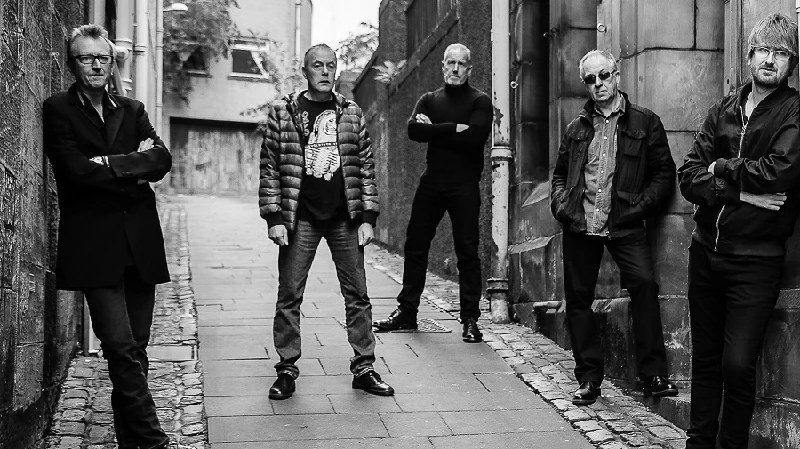
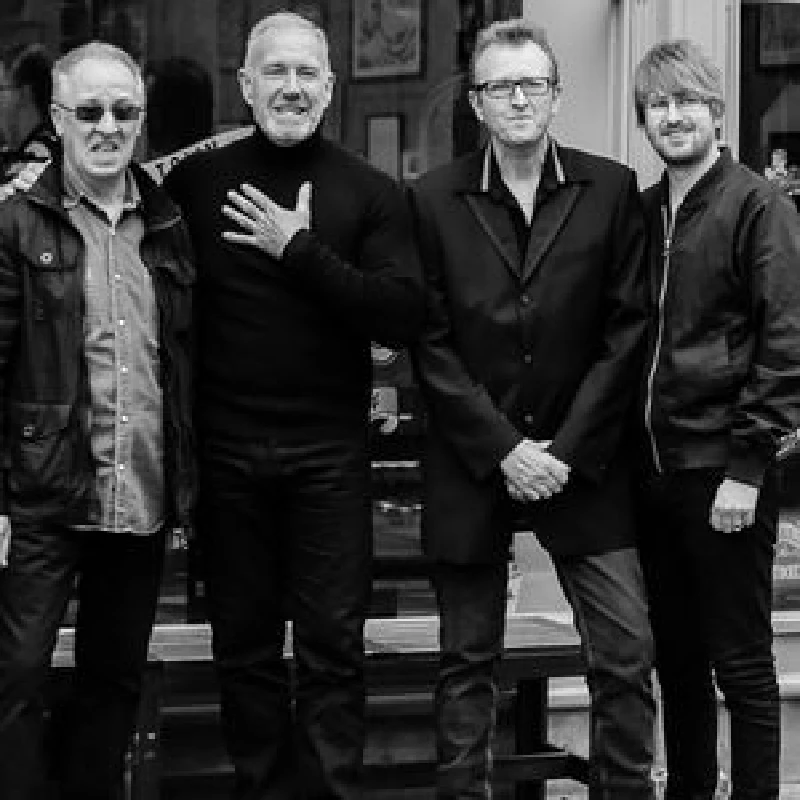
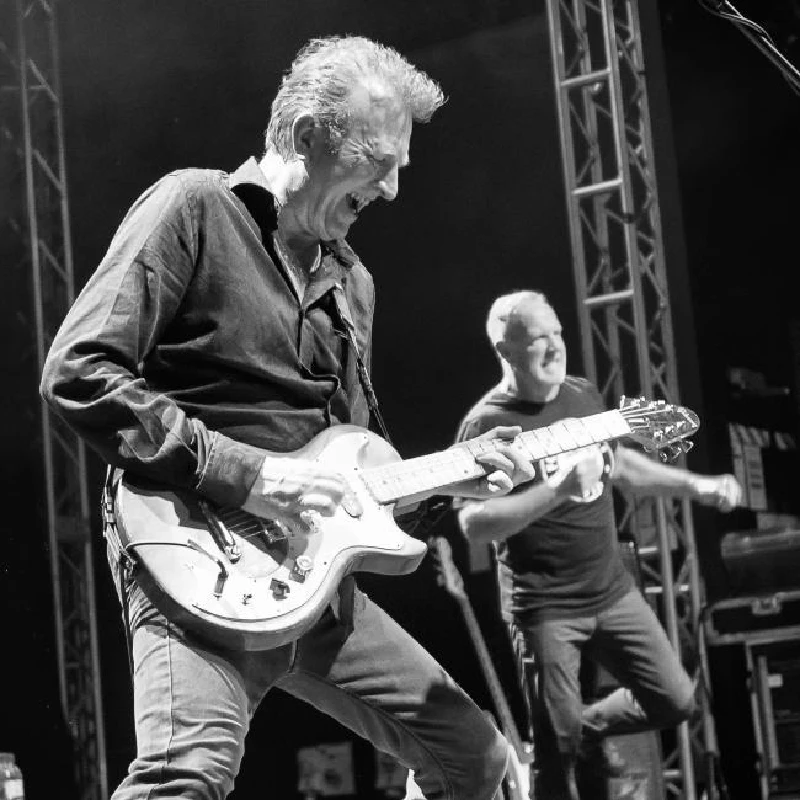
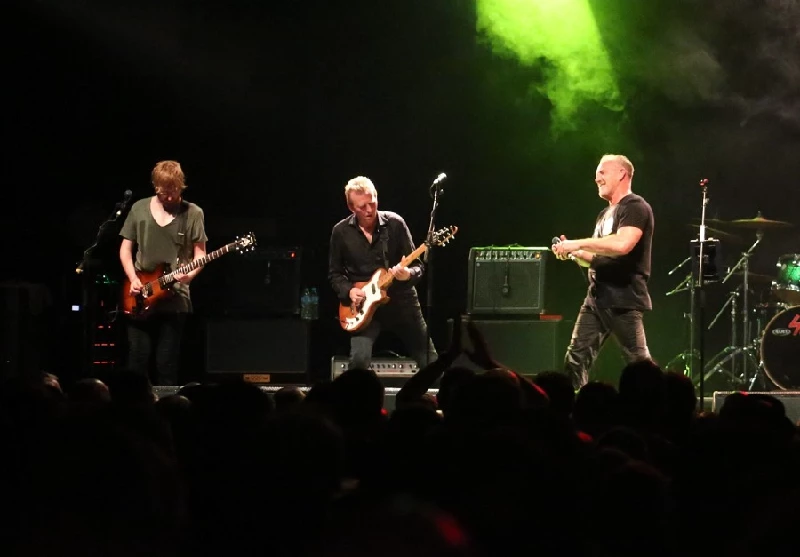
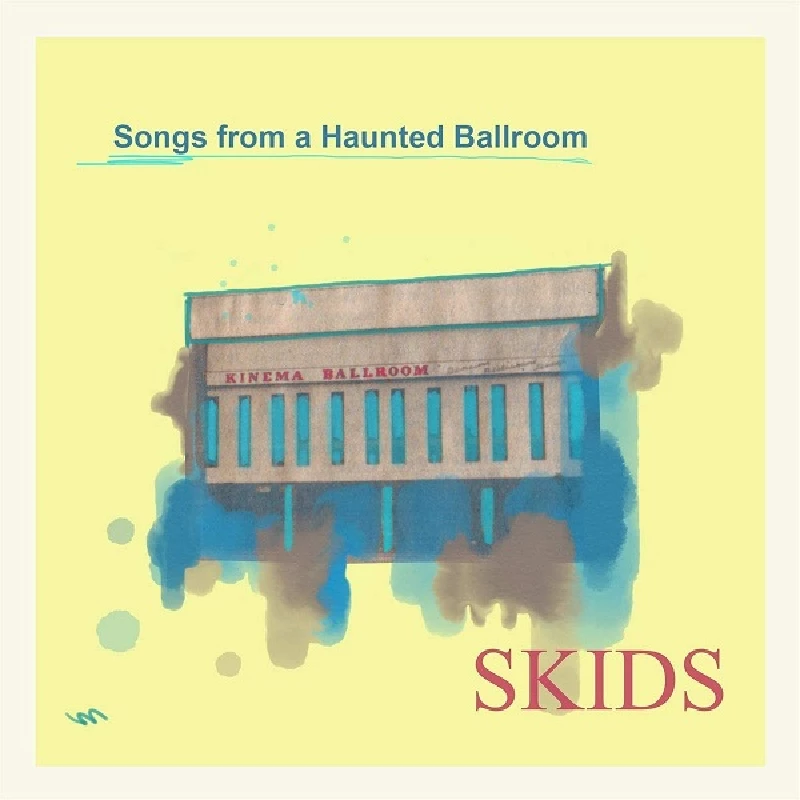
intro
Andrew Twambley chats to Richard Jobson, lead singer of Scottish punk / New Wave legends The Skids about their new covers LP, 'Songs From A Haunted Ballroom', which pays homage to the Kinema Ballroom in their hometown of Dunfermline.
interviews |
|
Interview (2019) |
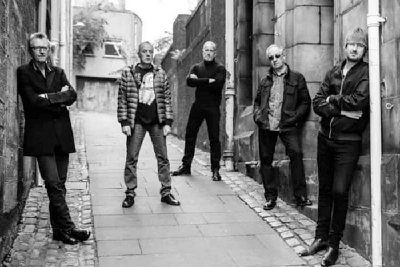
|
| Nick Dent-Robinson speaks to Richard Jobson, the frontman with Scottish 70's punks the Skids, about their reformation and first album in nearly forty years, 'Burning Cities'. |
| Interview (2009) |
profiles |
|
Live 2010 (2011) |
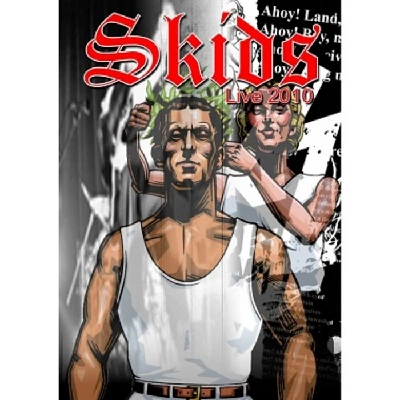
|
| Tony Gaughan finds the Skids to be in exhilarant style and to have lost none of their punk ethos on new live DVD, which was filmed at a reunion gig in their native Dunfermline last year |
live reviews |
|
Scala, London, 3/12//2009 |
reviews |
|
Scared To Dance (2006) |
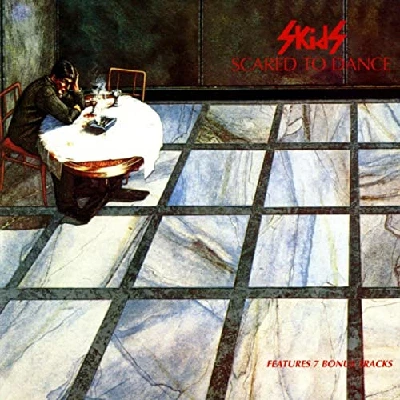
|
| Re-release of Scottish punks the Skids' 1979 debut LP, which shows that they were a fantastic singles, but not an album band |
most viewed articles
current edition
John McKay - InterviewRobert Forster - Interview
Cathode Ray - Interview
Spear Of Destiny - Interview
Fiona Hutchings - Interview
When Rivers Meet - Waterfront, Norwich, 29/5/2025
Carl Ewens - David Bowie 1964 to 1982 On Track: Every Album, Every Song
Chris Wade - Interview
Brian Wilson - Ten Songs That Made Me Love...
Shrag - Huw Stephens Session 08.12.10 and Marc Riley Session 21.03.12
previous editions
Heavenly - P.U.N.K. Girl EPBoomtown Rats - Ten Songs That Made Me Love....
Allan Clarke - Interview
Manic Street Preachers - (Gig of a Lifetime) Millennium Stadium, Cardiff, December 1999
Oasis - Oasis, Earl's Court, London, 1995
Barrie Barlow - Interview
Dwina Gibb - Interview
Beautiful South - Ten Songs That Made Me Love...
Pixies - Ten Songs That Made Me Love...
Sound - Interview with Bi Marshall Part 1
most viewed reviews
current edition
Peter Doolan - I Am a Tree Rooted to the Spot and a Snake Moves Around Me,in a CircleVinny Peculiar - Things Too Long Left Unsaid
Garbage - Let All That We Imagine Be The Light
Vultures - Liz Kershaw Session 16.06.88
John McKay - Sixes and #Sevens
Little Simz - Lotus
HAIM - I Quit
Morcheeba - Escape The Chaos
Eddie Chacon - Lay Low
Billy Nomates - Metalhorse
related articles |
|
Richard Jobson: Interview (2019 |
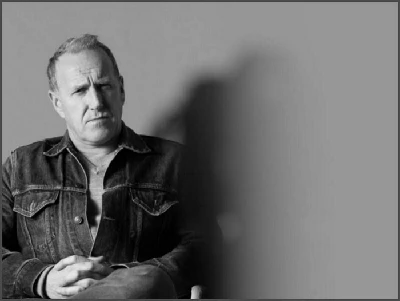
|
| Richard Jobson, the frontman with 70's-formed Scottish punk band the Skids, speaks to John Clarkson about their reunion, new acoustic album 'Peaceful Times', and his forthcoming solo tour. |
| Richard Jobson: Interview (2019) |
Pennyblackmusic Regular Contributors
Adrian Janes
Amanda J. Window
Andrew Twambley
Anthony Dhanendran
Benjamin Howarth
Cila Warncke
Daniel Cressey
Darren Aston
Dastardly
Dave Goodwin
Denzil Watson
Dominic B. Simpson
Eoghan Lyng
Fiona Hutchings
Harry Sherriff
Helen Tipping
Jamie Rowland
John Clarkson
Julie Cruickshank
Kimberly Bright
Lisa Torem
Maarten Schiethart